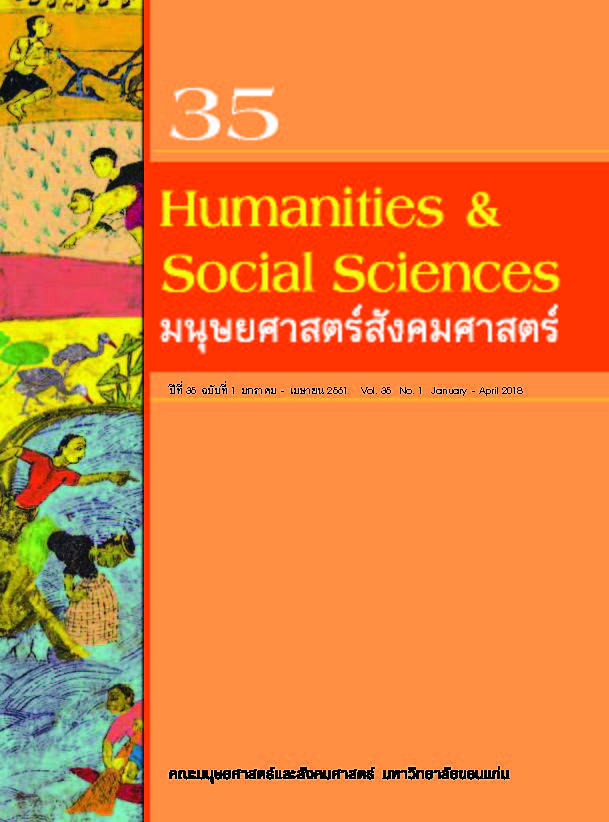การสร้างเครือข่ายทางสังคมเพื่อการดำรงชีพของชุมชนชนบทในภาคตะวันออกเฉียงเหนือตอนล่าง ประเทศไทย
Abstract
บทคัดย่อ
บทความนี้ศึกษาการสร้างเครือข่ายทางสังคมเพื่อการดำรงชีพของชุมชนชนบทในภาคตะวันออกเฉียงเหนือตอนล่าง ประเทศไทย ใช้การวิจัยเชิงคุณภาพในการศึกษา เครื่องมือในการเก็บรวบรวมข้อมูล ได้แก่ การสังเกตแบบไม่มีส่วนร่วมและการสัมภาษณ์กลุ่ม เก็บข้อมูลจากสมาชิกชุมชนชนบทจำนวน 30 ราย ในพื้นที่ ได้แก่ ชุมชนบ้านปรีง อำเภอท่าตูม จังหวัดสุรินทร์ เพื่ออธิบายวิธีการสร้างเครือข่ายทางสังคมในชุมชนชนบท พบว่า การสร้างเครือข่ายมีรูปแบบและวิธีการที่หลากหลายขึ้นอยู่กับบริบทแวดล้อมที่แตกต่างกัน สามารถจำแนกออกเป็น 3 ยุคสมัย ได้แก่ 1) เครือข่ายทางสังคมในยุคก่อตั้งชุมชน ที่มีวิธีการสร้างเครือข่ายทางสังคมผ่านระบบการแลกเปลี่ยนสินค้าเพื่อการดำรงชีพและระบบเครือญาติ 2) เครือข่ายทางสังคมกับการย้ายถิ่นเพื่อดำรงชีพ ครัวเรือนชนบทจำนวนมากตัดสินใจส่งสมาชิกของตนย้ายถิ่นเพื่อไปทำงานประมงทะเล เครือข่ายทางสังคมถูกสร้างขึ้นผ่านการเกิดขึ้นของนายหน้าแรงงานประมงภายในชุมชน และ 3) เครือข่ายทางสังคมกับการผลิต “ข้าว” เครือข่ายทางสังคมเกิดขึ้นผ่านระบบการค้าข้าวแบบพันธะสัญญาและก่อให้เกิดความสัมพันธ์เชิงอำนาจระหว่างผู้มีส่วนได้ส่วนเสียในการผลิตข้าว นอกจากนี้เครือข่ายทางสังคมยังคงถูกใช้เป็นเครื่องมือในการดึงแรงงานย้ายถิ่นเข้าสู่ระบบอุตสาหกรรมอย่างต่อเนื่องจนถึงปัจจุบัน
คำสำคัญ: เครือข่ายทางสังคม, การดำรงชีพ, ชุมชนชนบท, แรงงานย้ายถิ่น
ABSTRACT
This paper investigates the construction of social network for livelihoods among rural communities in lower-northeastern Thailand. Qualitative methodology, specifically phenomenological approach, was applied to the study. Non-participatory observation and group interview were applied as research instruments to collect primary data from 30 members of rural community in Surin Province, and data analysis was done by the content analysis method. Research results found a variety of social network patterns which were constructed based on different times and places. The construction of social network was divided into 3 periods which were 1) community establishment period which social network was constructed by barter system and kinship system. 2) Migration period when a large number of rural households decided sending their members into fishing industry in order to sustain the household livings. Social network was constructed through the brokerage system which recruited rural migrants to fishing industry, and 3) rice production period when the capitalism invaded rural communities. Social network was constructed through the contract farming system, and it resulted in complexity of rice production stakeholders. In addition, social network was used as a tool to recruit rural migrants to industrial works.
Keywords: Social Network, Livelihoods, Rural Communities, Rural Migrants



